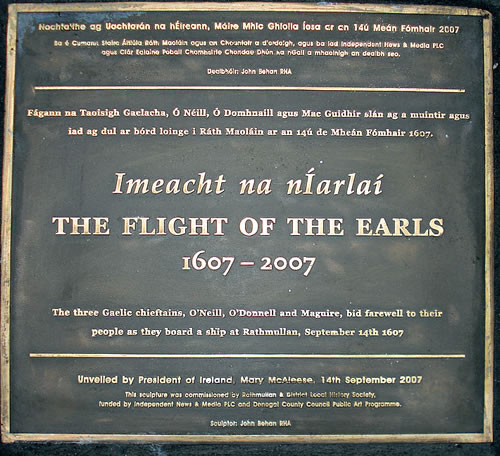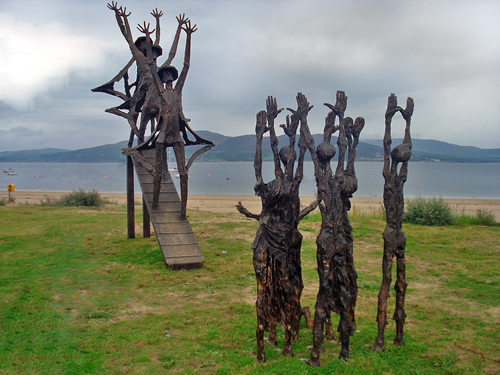| Irish Forums Message Discussion :: The flight of the earls |
   | Irish Forums :: The Irish Message
Forums About Ireland and the Irish Community, For the Irish home and Abroad. Forums include- Irish Music, Irish History, The Irish Diaspora, Irish Culture, Irish Sports, Astrology, Mystic, Irish Ancestry, Genealogy, Irish Travel, Irish Reunited and Craic
|  
|
|
|
| Irish
Author |
The flight of the earls Sceala Irish Craic Forum Irish Message |
jodonnell

Sceala Philosopher
Location: NYC
|
| Sceala Irish Craic Forum Discussion:
The flight of the earls
|
|
|
Fri Sep 14, 2007
On 14th September 1607 a boat sails from Lough Swilly into an ocean of propaganda, myth and romance. It carries the cream of Gaelic aristocracy away with it, never to return.
This is a Commemoration of the 400th Anniversary of the flight of the earls.

The Flight of the Earls references the departure from Ireland on 14 September 1607 of Hugh O'Neill, 2nd Earl of Tyrone and Rory O'Donnell, 1st Earl of Tyrconnell.
The 400th anniversary of the Flight of the Earls is being marked on 14 September 2007, throughout Donegal, including a regatta of tall ships, fireworks, lectures, and conferences. There is a permanent exhibition dedicated to the Flight of the Earls and the subsequent Plantation in Draperstown in the north of Ireland and at the "Flight of the Earls Centre" in the Martello Tower at Rathmullan.
The Earls set sail from Rathmullan, a village on the shore of Lough Swilly in County Donegal, accompanied by ninety followers, many of them Ulster noblemen, and some members of their families. Several left their wives behind, hoping either to return or retrieve them later.

The three Gaelic Chieftains, O'Neill, O'Donnell and Maguire, bid farewell to their people as they board a ship at Rathmullen. County Donegal. September 14th 1607
The late Tomas Cardinal O’Fiaich, Cardinal Archbishop of Armagh, gave a lecture at Rathmullan in September 1988, recounted with his permission and that of the Donegal Historical Society in O’Domhnaill Abu, issue no. 11, of Summer 1989, in which he recounted that Earl O’Neill of Tyrone “had a gold cross which contained a relic of the True Cross, and this he trailed in the water behind the ship, and according to O’Ciainain, it gave some relief from the storm”, during the crossing to Quillebeouf where they arrived on finally on the Continent on 4 October 1607. The significance of this act is also underlined by the fact that the date of the exile from Rathmullan was the Feast of the Exaltation of the Holy Cross. This relic of the True Cross was probably a minor relic from that kept at Holy Cross Abbey which they had previously visited en route to Kinsale in 1601.
Their destination was Spain, but they disembarked in France and proceeded overland to Spanish Flanders, some remaining in Louvain, whilst the main party continued to Italy. They planned to return to Ireland and with campaign for the recovery of their realms, with the support of Spain, but both died in exile.
The Flight of the Earls was a watershed in Irish history, as the ancient Gaelic aristocracy of Ulster went in to permanent exile. Despite their attachment to the Gaelic system, the Earls had reluctantly accepted their Earldoms from the English-run Kingdom of Ireland, under a policy known as surrender and re-grant. But their flight was forced upon them by the Tudor re-conquest of Ireland, which cleared the way for the Plantation of Ulster.
Background to the Exile
After their defeat at the Battle of Kinsale in 1601, and the suppression of their rebellion in Ulster in 1603, Tyrone and the Prince of Tyrconnell, Lord Tyrconnell's elder brother and predecessor, had been forced into exile in January 1602 by the victorious English government of Ireland under the leadership of the Lord Mountjoy. They retained their lands and titles, although with much diminished extent and authority. However, the countryside was laid bare in a campaign of destruction in 1602, and induced famine in 1603. When King James I took the throne in 1603 he quickly proceeded to issue pardons for the Irish lords and their rebel forces.
But by then, on 10 September 1602 the Prince of Tyrconnell had already died, allegedly assassinated, in Spain, and his brother succeeded him as 25th Chieftain of the O'Donnell clan. He was later granted the Earldom of Tyrconnell by King James I on 4 September 1603, and restored to a somewhat diminished scale of territories in Tyrconnell on 10 February 1604.
In 1605 the new Lord Deputy of Ireland, Sir Arthur Chichester, began to encroach on the freedoms of the two Earls. Fearing arrest, they chose to flee to the Continent, where they hoped to recruit an army for the invasion of Ireland with Spanish help. However, earlier in 1607 the Spanish fleet had been destroyed by the Dutch in the Battle of Gibraltar. Also as the Anglo–Spanish War (1585) had ended in 1604, King Philip III of Spain wanted to preserve the recent peace with England under its new Stuart dynasty. Tyrone ignored these realities, remained in Italy, and persisted with his invasion plan until his death in exile in 1616.
The Attainders
Meanwhile their titles were attainted in 1614, although they continued to be recognized on the Continent. It can be noted that the attainder of these titles in 1614 – six years after Earl of Tyrconnell’s death in Rome in 1608 – can hardly have been considered legitimate, at least in continental Catholic countries of the day. Even within the context of English and its colonial Irish rule, the attainder came about six years after Rory, 1st Earl of Tyrconnell, had already died. As accused, for him to have been properly tried, he should have been tried by his peers in the Peerage of Ireland, under the presiding authority of the Lord High Steward of Ireland. However, he was already dead, unable to stand in his own defense, and his title already inherited by his son Hugh “Albert” O'Donnell, therefore in order to attaint the title, the trial would have to have been of Hugh “Albert”, who had in fact committed no crime.
The attainder was therefore considered by many a travesty of justice and was considered null and void by many on the Continent. The Earl of Tyrconnell's son, Hugh “Albert” O'Donnell's succession as 2nd Earl of Tyrconnell (1st creation) was therefore recognized as valid abroad, not least in the Spanish realm.
But even more importantly, in a Papal Bull of 1555, the Pope conferred the title King of Ireland on King Philip II of Spain, having excommunicated King Henry VIII of England for breaking with Papal authority, and for arrogating to himself the title King of Ireland, whereas Ireland had hitherto been a lordship held by the King of England as vassal of the Pope ever since the English-born Pope Adrian IV had granted it to King Henry. This is how the Irish lords of Tyrconnell and Tyrone had come to solicit help from Spain, in submission and recognition of its Monarch’s suzerainty.
The 400th anniversary of the Flight of the Earls in September 2007 has proven to be an occasion of historical as well as contemporary interest. In large measure, N.Ireland’s ‘Troubles’ originated with the departure of the northern nobles, Hugh O’Neill, Earl of Tyrone and Rory O’Donnell, Earl of Tyrconnell. Ironically, the quarter centenary has coincided with a political agreement that has broken a centuries old political log-jam. At the end of 2006, the Taoiseach, Bertie Ahern, predicted the impending political breakthrough: ‘I believe that 2007 can be a year as historic as any in our past. For the first time in 400 years, since the Flight of the Earls and the beginning of the Ulster plantation, there can be agreement between all of the representatives of all the people of this island’.
A defining moment in Irish history for ‘native’ and ‘planter’ alike, the exodus of the northern earls has been commemorated locally, nationally and internationally (including Louvain, Chicago, Lisbon and Rome).
Perhaps the most important aspect of the Flight of the Earls for people of Irish descent, and for countries that the Irish migrated to, is that the Flight effectively inaugurated the Irish diaspora. The early seventeenth century witnessed Irish men and women dispersed as far afield as the Netherlands, Spain, Italy, Newfoundland, even the Amazon (O'Briens). As a direct result of the Flight, Irish soldiers, the original ‘wild geese’, saw service in Sweden, Denmark, Poland and Russia.
Events in Ireland for the flight of the earls 400
Events for 2007
Friday, Oct. 26, 2007 - Monday, Oct. 29, 2007
Hughie Gillespie Weekend, Ballybofey
Saturday, Oct. 20, 2007
Talk on Flight of the Earls - Peadar O Donnell Weekend, Dungloe, Co. Donegal
Monday, Oct. 15, 2007 - Friday, Oct. 26, 2007
Wainfest - Childrens Book Festival Co. Donegal
Thursday, Sep. 20, 2007 - Saturday, Sep. 22, 2007
Making History by Brian Friel
'Making History' - to commemorate the 400th Anniversary of the Flight of the Earls.
In September 1607 the Earl of Tyrone Hugh O’Neill and the Earl of Tyrconnell Rory O’Donnell boarded a ship at Rathmullan in Donegal, bound for Spain. This event happened six years after the Battle of Kinsale and is known as the Flight of the Earls. Their ship never reached Spain and Hugh O’Neill died broken, blind and defeated in Rome.
This seminal event in Irish history has cast a long shadow over Ireland’s political and cultural life and has been brilliantly addressed by Brian Friel (arguably Ireland’s greatest living playwright) in his play Making History.
Wednesday, Sep. 19, 2007
Making History by Brian Friel
Monday, Sep. 17, 2007
Making History by Brian Friel
Sunday, Sep. 16, 2007
Tours of the Jeanie Johnson
Sunday, Sep. 16, 2007
Arrival of Commemorative March Donegal Town - Rathmullan, Rathmullan
Sunday, Sep. 16, 2007
Concert: One Less Petal, One Less Flame, Milford
Sunday, Sep. 16, 2007
Jeanie Johnson Sail of Lough Swilly
Saturday, Sep. 15, 2007
Family Carnival Afternoon with Inishowen Carnival Group, Rathmullan
Saturday, Sep. 15, 2007
Tours of the Jeanie Johnson, Rathmullan
Friday, Sep. 14, 2007 - Sunday, Sep. 16, 2007
Commemorative March Donegal Town - Rathmullan Co. Donegal
Walk from Donegal Town to Rathmullan on the 400th Anniversary of the Flight of the Earls
Friday, Sep. 14, 2007
An Evening on Board The Jeanie Johnson
Friday, Sep. 14, 2007
Jeanie Johnson Sail of Lough Swilly
|
|
|
|
|
|
|
|
|
|












